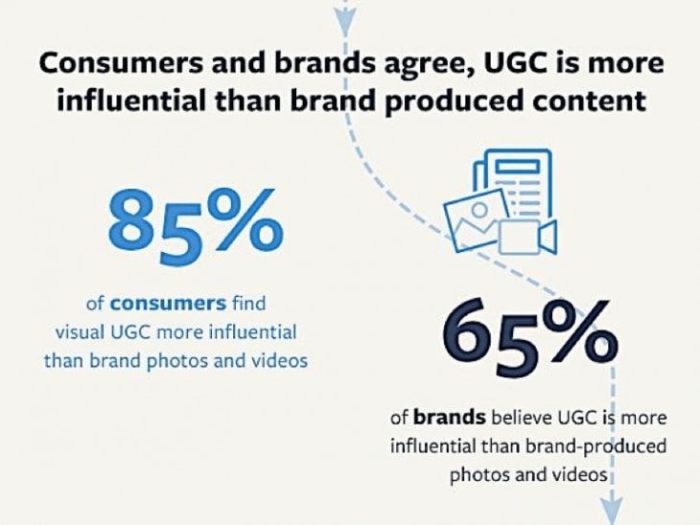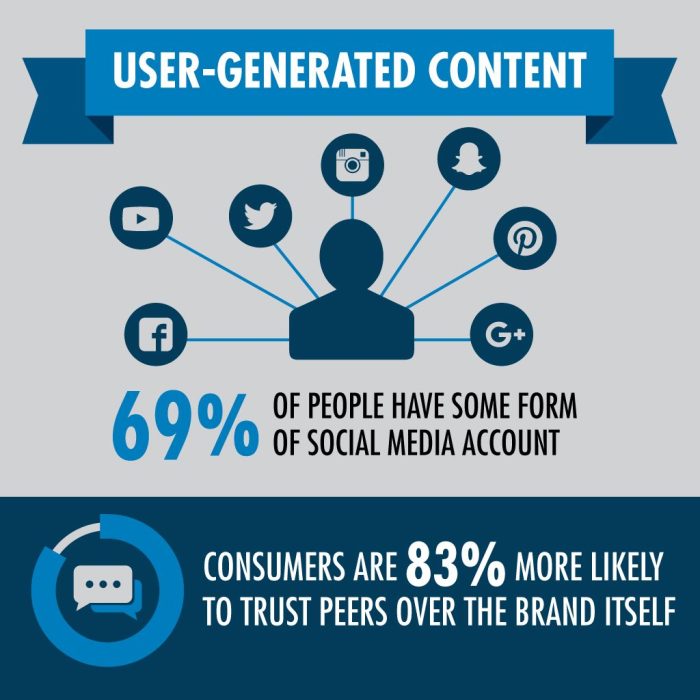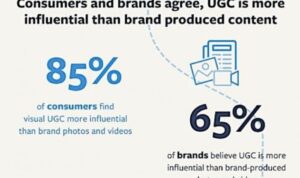Using User-Generated Content sets the stage for this enthralling narrative, offering readers a glimpse into a story that is rich in detail with american high school hip style and brimming with originality from the outset.
User-Generated Content (UGC) is the fuel that drives modern digital marketing, giving brands a unique way to connect with their audience and build authenticity. From reviews to social media posts, UGC comes in various forms, playing a crucial role in engaging consumers and creating social proof. In this dynamic landscape, harnessing the power of UGC can elevate your marketing strategy to new heights.
Definition of User-Generated Content: Using User-Generated Content

User-generated content (UGC) refers to any form of content created by individuals rather than brands or organizations. It includes a wide range of content such as reviews, social media posts, videos, blogs, podcasts, and more. UGC is authentic, created by real users, and often shared on various online platforms.
Examples of User-Generated Content
- Customer reviews on e-commerce websites like Amazon and Yelp
- Social media posts by users on platforms such as Instagram, Twitter, and Facebook
- User-created videos on YouTube and TikTok
- Blog posts written by individuals sharing their experiences or opinions
Importance of UGC in Digital Marketing
User-generated content plays a significant role in digital marketing for several reasons:
- Authenticity: UGC is perceived as more genuine and trustworthy by consumers compared to branded content.
- Engagement: UGC encourages interaction and engagement with the audience, leading to increased brand awareness and loyalty.
- Cost-effective: Leveraging UGC can reduce marketing costs as brands do not need to create content from scratch.
- Social proof: Positive user-generated content serves as social proof, influencing the purchasing decisions of potential customers.
Benefits of Using User-Generated Content

User-Generated Content (UGC) can be a powerful tool for brands looking to connect with their audience on a deeper level. Let’s dive into some of the key benefits of incorporating UGC into your marketing strategy.
Increased Brand Authenticity
When customers see real people using and enjoying your products or services, it adds a level of authenticity that traditional marketing tactics can’t match. User-generated content provides social proof that your brand is trustworthy and reliable, helping to build credibility with potential customers.
Enhanced Engagement with the Audience, Using User-Generated Content
By encouraging your audience to create and share their own content related to your brand, you are fostering a sense of community and engagement. When customers feel like their voice is being heard and valued, they are more likely to become loyal advocates for your brand, leading to increased brand loyalty and positive word-of-mouth marketing.
Creation of Social Proof for Products or Services
UGC serves as a form of social proof that can influence purchasing decisions. When consumers see others like them enjoying your products or services, they are more likely to trust your brand and make a purchase. This social proof can help drive conversions and boost sales by showcasing real-life examples of satisfied customers.
Strategies for Leveraging User-Generated Content
When it comes to leveraging user-generated content (UGC), there are some key strategies that can help you make the most out of what your users have to offer. From encouraging users to create content to effectively curating and showcasing UGC, each step plays a crucial role in maximizing the impact of user-generated content.
Encouraging Users to Create Content
- Run contests or challenges that inspire users to share their content.
- Create a user-friendly platform that makes it easy for users to submit their content.
- Offer incentives such as discounts, exclusive access, or recognition for those who contribute.
- Engage with users directly through social media or email to encourage content creation.
Curating and Showcasing UGC
- Implement a system for sorting through and selecting the best user-generated content.
- Display UGC prominently on your website or social media channels to increase visibility.
- Create a dedicated section or hashtag for UGC to make it easily accessible to your audience.
- Regularly update the curated content to keep it fresh and engaging for users.
Importance of Seeking Permission
- Always obtain permission from users before using their content to avoid any legal issues.
- Clearly communicate the terms of use to users so they understand how their content will be used.
- Respect the rights of content creators and give credit where credit is due.
- Building trust with your users by seeking permission and respecting their content can lead to a stronger relationship with your audience.
Best Practices for Implementing User-Generated Content
Implementing user-generated content (UGC) can be a powerful marketing tool, but it’s essential to follow best practices to ensure success. Here are some key steps to consider when incorporating UGC into your marketing strategy:
Monitoring and Moderating UGC
- Set up monitoring tools to track UGC across various platforms.
- Establish clear guidelines for what type of content is acceptable.
- Regularly review and moderate UGC to maintain quality and brand consistency.
- Respond promptly to any inappropriate or off-brand content.
Tips for Responding to UGC
- Engage with users who create positive UGC by thanking them and sharing their content.
- Address negative UGC professionally and offer solutions to any issues raised.
- Show empathy and understanding when responding to negative feedback.
- Use negative UGC as an opportunity to showcase your excellent customer service.
Measuring the Impact of UGC on Marketing Campaigns
- Track key metrics such as engagement, reach, and conversion rates for UGC posts.
- Compare the performance of UGC campaigns against other marketing initiatives.
- Solicit feedback from customers to gauge the effectiveness of UGC in influencing their purchasing decisions.
- Utilize analytics tools to assess the overall impact of UGC on brand awareness and loyalty.





